译林版(2020) 选择性必修第一册 Unit 1 Food Matters Grammar and usage课件 (33张ppt)
文档属性
| 名称 | 译林版(2020) 选择性必修第一册 Unit 1 Food Matters Grammar and usage课件 (33张ppt) |
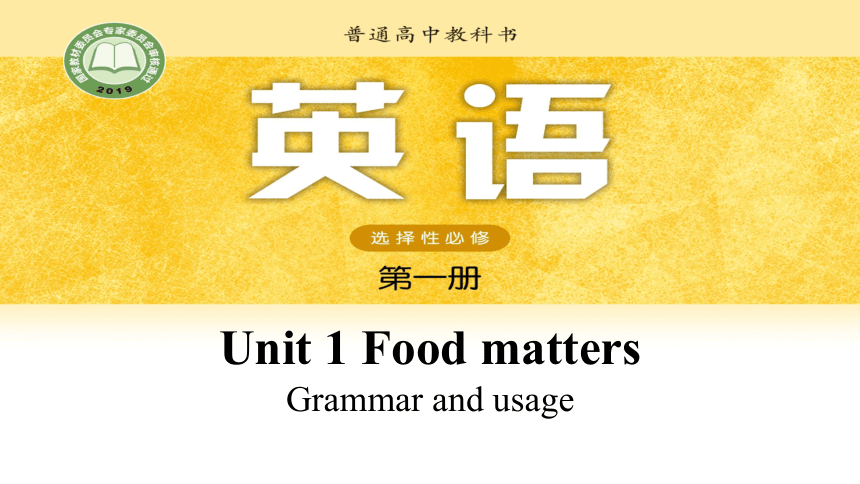
|
|
| 格式 | pptx | ||
| 文件大小 | 6.2MB | ||
| 资源类型 | 教案 | ||
| 版本资源 | 牛津译林版(2019) | ||
| 科目 | 英语 | ||
| 更新时间 | 2022-10-10 00:00:00 | ||
图片预览


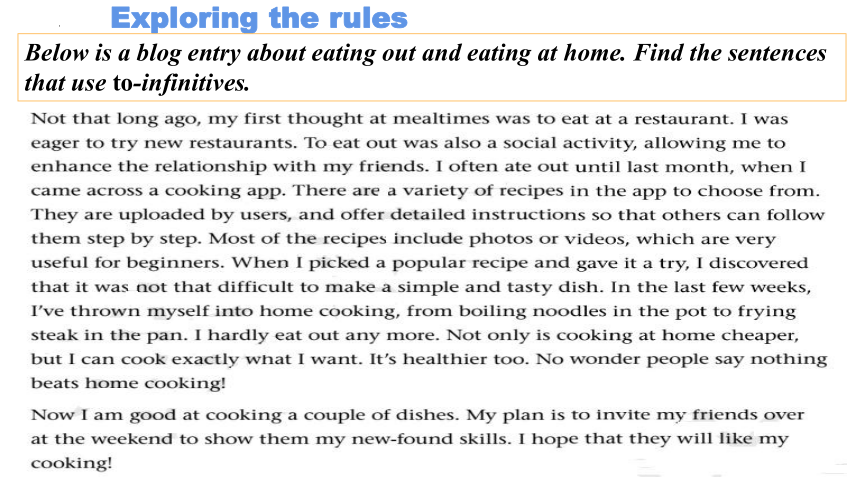
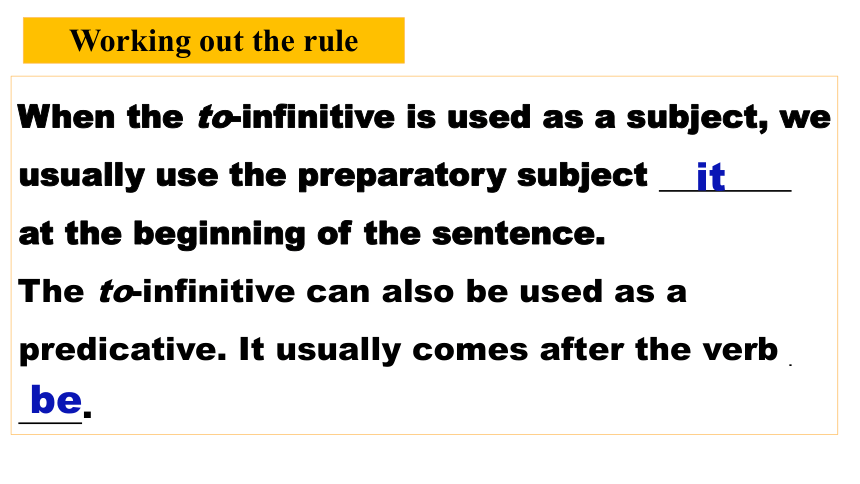
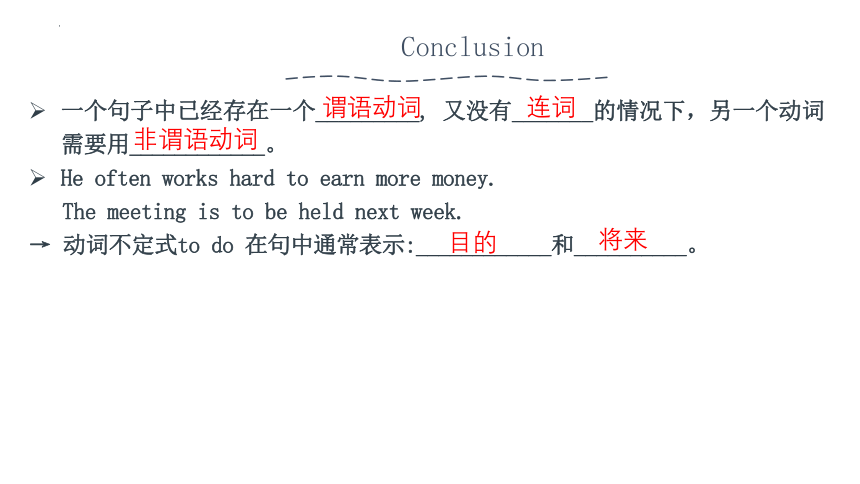
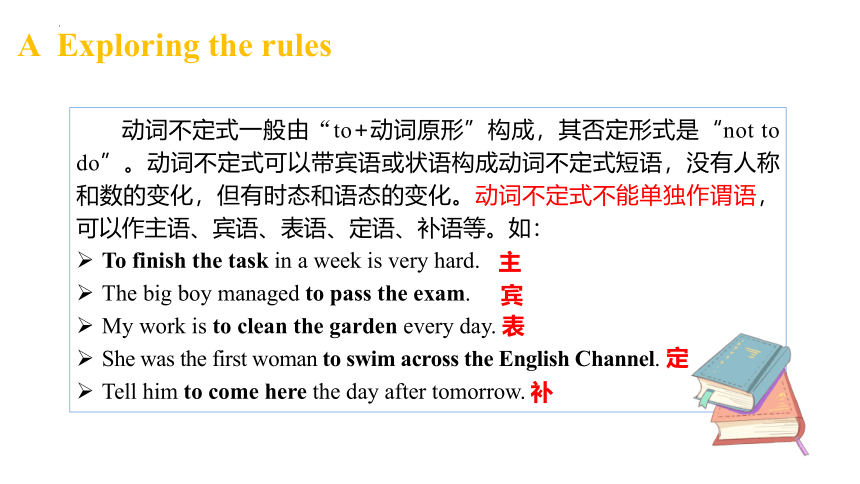
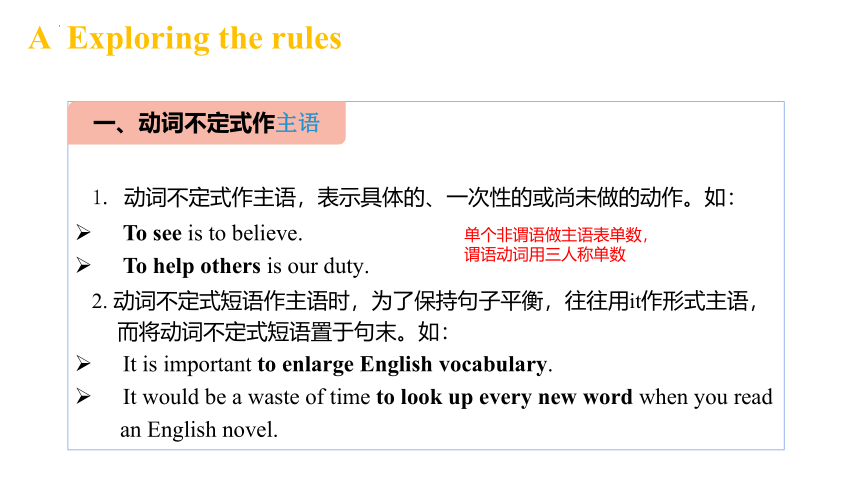
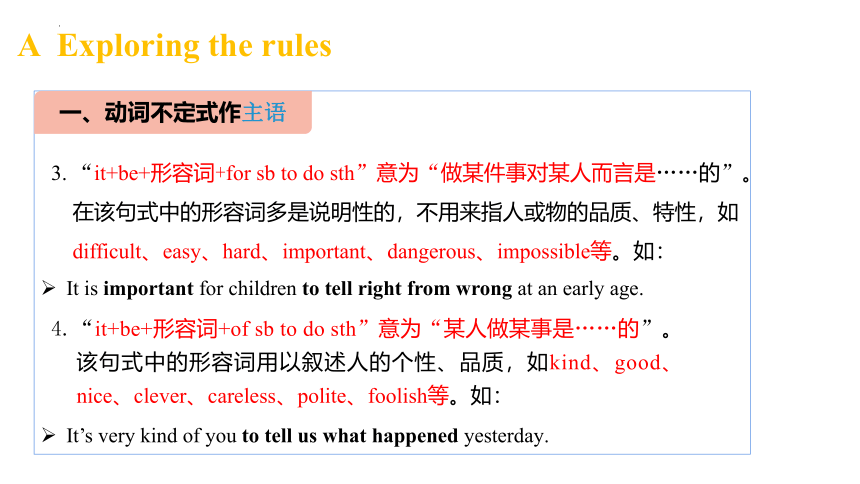
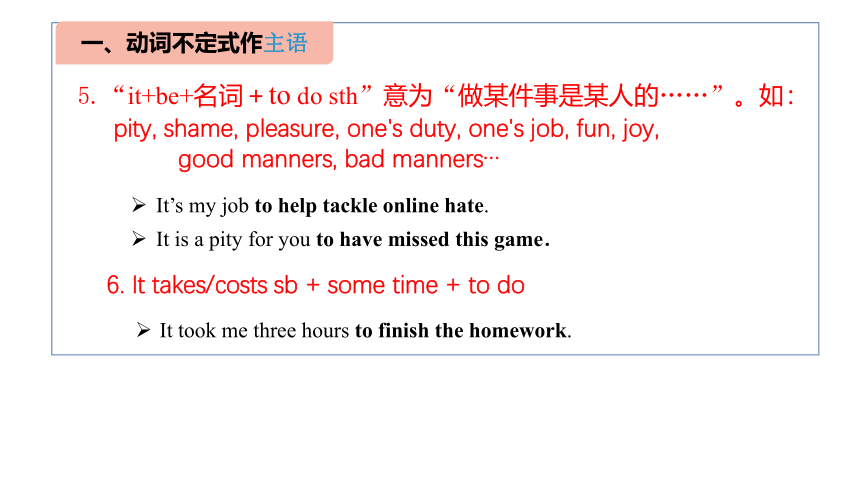
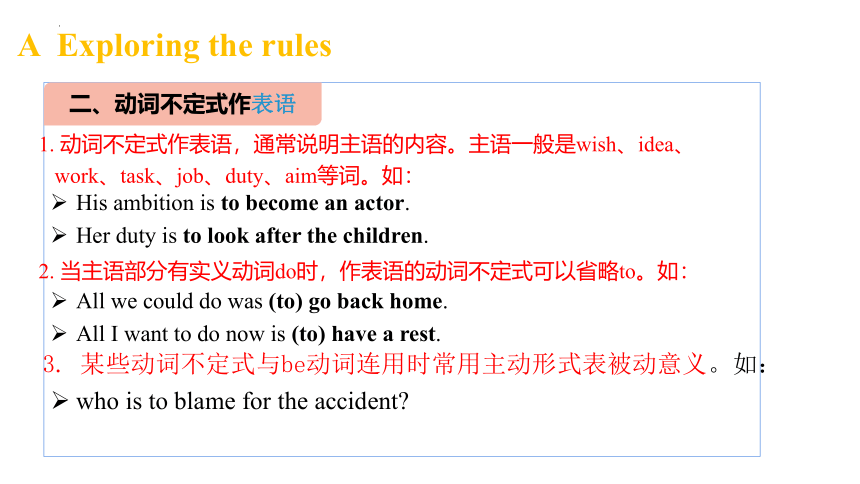


文档简介
(共33张PPT)
Unit 1 Food matters
Grammar and usage
Lead-in
Exploring the rules
Below is a blog entry about eating out and eating at home. Find the sentences that use to-infinitives.
Working out the rule
When the to-infinitive is used as a subject, we usually use the preparatory subject at the beginning of the sentence.
The to-infinitive can also be used as a predicative. It usually comes after the verb .
it
be
04
Conclusion
一个句子中已经存在一个_________, 又没有_______的情况下,另一个动词需要用____________。
He often works hard to earn more money.
The meeting is to be held next week.
→ 动词不定式to do 在句中通常表示:____________和__________。
谓语动词
连词
非谓语动词
目的
将来
A Exploring the rules
动词不定式一般由“to+动词原形”构成,其否定形式是“not to do”。动词不定式可以带宾语或状语构成动词不定式短语,没有人称和数的变化,但有时态和语态的变化。动词不定式不能单独作谓语,可以作主语、宾语、表语、定语、补语等。如:
To finish the task in a week is very hard.
The big boy managed to pass the exam.
My work is to clean the garden every day.
She was the first woman to swim across the English Channel.
Tell him to come here the day after tomorrow.
主
宾
表
定
补
A Exploring the rules
To see is to believe.
To help others is our duty.
It is important to enlarge English vocabulary.
It would be a waste of time to look up every new word when you read
an English novel.
一、动词不定式作主语
2. 动词不定式短语作主语时,为了保持句子平衡,往往用it作形式主语,而将动词不定式短语置于句末。如:
动词不定式作主语,表示具体的、一次性的或尚未做的动作。如:
单个非谓语做主语表单数,谓语动词用三人称单数
A Exploring the rules
It is important for children to tell right from wrong at an early age.
It’s very kind of you to tell us what happened yesterday.
一、动词不定式作主语
3. “it+be+形容词+for sb to do sth”意为“做某件事对某人而言是……的”。
在该句式中的形容词多是说明性的,不用来指人或物的品质、特性,如
difficult、easy、hard、important、dangerous、impossible等。如:
4.“it+be+形容词+of sb to do sth”意为“某人做某事是……的”。该句式中的形容词用以叙述人的个性、品质,如kind、good、nice、clever、careless、polite、foolish等。如:
5.“it+be+名词+to do sth”意为“做某件事是某人的……”。如:
pity, shame, pleasure, one's duty, one's job, fun, joy, good manners, bad manners…
It’s my job to help tackle online hate.
It is a pity for you to have missed this game.
6. It takes/costs sb + some time + to do
It took me three hours to finish the homework.
一、动词不定式作主语
A Exploring the rules
His ambition is to become an actor.
Her duty is to look after the children.
All we could do was (to) go back home.
All I want to do now is (to) have a rest.
who is to blame for the accident
二、动词不定式作表语
1. 动词不定式作表语,通常说明主语的内容。主语一般是wish、idea、
work、task、job、duty、aim等词。如:
2. 当主语部分有实义动词do时,作表语的动词不定式可以省略to。如:
3. 某些动词不定式与be动词连用时常用主动形式表被动意义。如:
(1)不定式作宾语时常直接放在谓语动词之后
e.g.I can't afford to buy a car.
(2)不定式作宾语时还常用it作形式宾语,而把真正的宾语—动词不定式置于句末。
常用结构为:
think /consider/find it adj.to do.
e.g.l found it necessary to talk to him again.
三、动词不定式作宾语
A Exploring the rules
只能加不定式作宾语的动词有:
e.g. I’m glad / pleased to see you.
We were surprised to hear the news.
Look at the sentences and find the rules.
不定式可以用在某些形容词后作宾语,如:sorry, surprised, happy, glad, eager, angry, foolish, right, wrong, slow, quick, rude, cruel, disappointed…
A Exploring the rules
e.g. My mum asks me to play the piano
two hours every day.
结构: V. sb. to do sth.
常跟动词不定式作宾语补足语,这类动词有
allow, advise, ask, call, cause, encourage,
expect, force, get, invite, need, order,
prefer, remind, teach, tell, train, warn等。
四、动词不定式作宾补
不定式作宾补时不带to的情况
结构: V. sb. do sth.
这类的动词有:
1) 感官动词(feel, hear, listen to,
watch, look at, notice, observe)后;
2) 使役动词 (let, have, make)后,
3)特殊动词help后动词不定式要省略to,
即help sb. do sth.(帮助某人做某事)
但是在被动语态中要还原to。
不定式作定语,一般作后置定语,修饰前面的名词或代词。(不及物动词需要加上介词)
Kate is looking for a suitable coat to wear.
Tom has a nice pen to write with.
A Exploring the rules
五、动词不定式作定语
如果不定式是不及物动词, 则后面需加
适当的介词。
e.g. My family have a comfortable house to live ___.
in
e.g. She is always the first student to come.
He is the best man to do the job.
something, anything, nothing, everything等不定代词常用不定式作后置定语。
当名词前有序数词the first, the last, 或the only或及形容词最高级修饰时,后常用不定式作定语。
A Exploring the rules
1) 表示目的: to do
in order to do
so as to do
e.g. He spoke loudly (so as / in order)
to be heard.
六、动词不定式作状语
so + adj. / adv. + as to do …
such + n. + as to do … 如此...以至于
adj. / adv. + enough + to do 够...以至于
too + adv. / adj. + to do 太...以至于不能
e.g. He was so foolish as to believe it.
= He was such a fool as to believe it.
= He was foolish enough to believe it.
2) 表示结果:
他如此愚蠢相信了这件事
To tell the truth, I am not happy at the
moment.
to be frank
to be honest
to tell the truth
七. 独立结构
A Exploring the rules
不定式的基本形式
to do表示一般情况
I am glad to see you.
不定式的一般时 to do
The boy pretended to be reading when his mother came in.
不定式的进行时 to be doing
to be doing强调动作正在进行。
The novel is believed to have been
translated into Chinese.
不定式的完成时 to have done
不定式所表示的动作发生在谓语动作
或状态之前,强调已经完成
Practice 1
被邀请到你家做客真的是太荣幸了。
.
在家做饭准备环节需要花很长时间。
.
It is a great honour to be invited to your family.
It takes a long time to prepare for home-cooked meals.
你为我们做了这么多美味的菜真的是太好了。
It is nice of you to make so many tasty dishes for us.
在当今社会,我们学会做饭还是很有用的。
It is useful for us to learn how to cook.
Rewrite the following sentences, using to-infinitives.
The next dish to be prepared by the cook is ...
To prepare home-cooked meals is ...
Her dream is to open a restaurant some day.
...in the pot first (in order) to cook them quickly.
I consider the Soup of the Day to be the best ...
Complete the article with the correct forms of the verbs in the brackets.
Located
to turn
to sit
painted
ranging
to invite
to be
to see
Practice 3
单句语法填空
1. (learn) is to be better life.
2. It was kind of you (give) me a helping hand.
3. (climb) up the mountain is easy while to go down the hills is hard.
4. Above all, I have come to understand that
(bring) happiness to others is getting ourselves happiness.
5. It took years of work (reduce) the individual pollution and clean the water.
To learn
to give
To climb
bringing
to reduce
6. (complte) the task needs time.
7. It is easy me to learn how to drive.
8. It is very kind the young man to say so.
9. Don’t waste time. It’s no good (try) to persuade him.
10. (know) basic first-aid techniques will help you respond quickly to emergencies.
11. His ambition is (become) an actor.
12. Officials believe that more than one person may be (blame) for the fire.
To complete
of
for
trying
Knowing
to become
to blame
13. The poor girl appeared so (frighten). She must have seen something
(frighten) on her way home.
14. Please remain (seat) until the plane has come to a cpmplete stop.
15. The manager was (delight) to see so many new products developed after great effort.
16. As you can imagine, if your skin gets
(burn), it can be very serious.
frightened
frightening
seated
delighted
burned/buent
17. It was (surprise) that Tom had chosen her as his partner at the party.
18. The way you raised yesterday to solve the problem proved (be) better.
19. It remains (see) whether Jim is fit enough to play in the final.
20. My deskmate showed no anxiety in face of the competition; she seemed (prepare) for it pretty well.
surprising
to be
to be seen
to have prepared
Unit 1 Food matters
Grammar and usage
Lead-in
Exploring the rules
Below is a blog entry about eating out and eating at home. Find the sentences that use to-infinitives.
Working out the rule
When the to-infinitive is used as a subject, we usually use the preparatory subject at the beginning of the sentence.
The to-infinitive can also be used as a predicative. It usually comes after the verb .
it
be
04
Conclusion
一个句子中已经存在一个_________, 又没有_______的情况下,另一个动词需要用____________。
He often works hard to earn more money.
The meeting is to be held next week.
→ 动词不定式to do 在句中通常表示:____________和__________。
谓语动词
连词
非谓语动词
目的
将来
A Exploring the rules
动词不定式一般由“to+动词原形”构成,其否定形式是“not to do”。动词不定式可以带宾语或状语构成动词不定式短语,没有人称和数的变化,但有时态和语态的变化。动词不定式不能单独作谓语,可以作主语、宾语、表语、定语、补语等。如:
To finish the task in a week is very hard.
The big boy managed to pass the exam.
My work is to clean the garden every day.
She was the first woman to swim across the English Channel.
Tell him to come here the day after tomorrow.
主
宾
表
定
补
A Exploring the rules
To see is to believe.
To help others is our duty.
It is important to enlarge English vocabulary.
It would be a waste of time to look up every new word when you read
an English novel.
一、动词不定式作主语
2. 动词不定式短语作主语时,为了保持句子平衡,往往用it作形式主语,而将动词不定式短语置于句末。如:
动词不定式作主语,表示具体的、一次性的或尚未做的动作。如:
单个非谓语做主语表单数,谓语动词用三人称单数
A Exploring the rules
It is important for children to tell right from wrong at an early age.
It’s very kind of you to tell us what happened yesterday.
一、动词不定式作主语
3. “it+be+形容词+for sb to do sth”意为“做某件事对某人而言是……的”。
在该句式中的形容词多是说明性的,不用来指人或物的品质、特性,如
difficult、easy、hard、important、dangerous、impossible等。如:
4.“it+be+形容词+of sb to do sth”意为“某人做某事是……的”。该句式中的形容词用以叙述人的个性、品质,如kind、good、nice、clever、careless、polite、foolish等。如:
5.“it+be+名词+to do sth”意为“做某件事是某人的……”。如:
pity, shame, pleasure, one's duty, one's job, fun, joy, good manners, bad manners…
It’s my job to help tackle online hate.
It is a pity for you to have missed this game.
6. It takes/costs sb + some time + to do
It took me three hours to finish the homework.
一、动词不定式作主语
A Exploring the rules
His ambition is to become an actor.
Her duty is to look after the children.
All we could do was (to) go back home.
All I want to do now is (to) have a rest.
who is to blame for the accident
二、动词不定式作表语
1. 动词不定式作表语,通常说明主语的内容。主语一般是wish、idea、
work、task、job、duty、aim等词。如:
2. 当主语部分有实义动词do时,作表语的动词不定式可以省略to。如:
3. 某些动词不定式与be动词连用时常用主动形式表被动意义。如:
(1)不定式作宾语时常直接放在谓语动词之后
e.g.I can't afford to buy a car.
(2)不定式作宾语时还常用it作形式宾语,而把真正的宾语—动词不定式置于句末。
常用结构为:
think /consider/find it adj.to do.
e.g.l found it necessary to talk to him again.
三、动词不定式作宾语
A Exploring the rules
只能加不定式作宾语的动词有:
e.g. I’m glad / pleased to see you.
We were surprised to hear the news.
Look at the sentences and find the rules.
不定式可以用在某些形容词后作宾语,如:sorry, surprised, happy, glad, eager, angry, foolish, right, wrong, slow, quick, rude, cruel, disappointed…
A Exploring the rules
e.g. My mum asks me to play the piano
two hours every day.
结构: V. sb. to do sth.
常跟动词不定式作宾语补足语,这类动词有
allow, advise, ask, call, cause, encourage,
expect, force, get, invite, need, order,
prefer, remind, teach, tell, train, warn等。
四、动词不定式作宾补
不定式作宾补时不带to的情况
结构: V. sb. do sth.
这类的动词有:
1) 感官动词(feel, hear, listen to,
watch, look at, notice, observe)后;
2) 使役动词 (let, have, make)后,
3)特殊动词help后动词不定式要省略to,
即help sb. do sth.(帮助某人做某事)
但是在被动语态中要还原to。
不定式作定语,一般作后置定语,修饰前面的名词或代词。(不及物动词需要加上介词)
Kate is looking for a suitable coat to wear.
Tom has a nice pen to write with.
A Exploring the rules
五、动词不定式作定语
如果不定式是不及物动词, 则后面需加
适当的介词。
e.g. My family have a comfortable house to live ___.
in
e.g. She is always the first student to come.
He is the best man to do the job.
something, anything, nothing, everything等不定代词常用不定式作后置定语。
当名词前有序数词the first, the last, 或the only或及形容词最高级修饰时,后常用不定式作定语。
A Exploring the rules
1) 表示目的: to do
in order to do
so as to do
e.g. He spoke loudly (so as / in order)
to be heard.
六、动词不定式作状语
so + adj. / adv. + as to do …
such + n. + as to do … 如此...以至于
adj. / adv. + enough + to do 够...以至于
too + adv. / adj. + to do 太...以至于不能
e.g. He was so foolish as to believe it.
= He was such a fool as to believe it.
= He was foolish enough to believe it.
2) 表示结果:
他如此愚蠢相信了这件事
To tell the truth, I am not happy at the
moment.
to be frank
to be honest
to tell the truth
七. 独立结构
A Exploring the rules
不定式的基本形式
to do表示一般情况
I am glad to see you.
不定式的一般时 to do
The boy pretended to be reading when his mother came in.
不定式的进行时 to be doing
to be doing强调动作正在进行。
The novel is believed to have been
translated into Chinese.
不定式的完成时 to have done
不定式所表示的动作发生在谓语动作
或状态之前,强调已经完成
Practice 1
被邀请到你家做客真的是太荣幸了。
.
在家做饭准备环节需要花很长时间。
.
It is a great honour to be invited to your family.
It takes a long time to prepare for home-cooked meals.
你为我们做了这么多美味的菜真的是太好了。
It is nice of you to make so many tasty dishes for us.
在当今社会,我们学会做饭还是很有用的。
It is useful for us to learn how to cook.
Rewrite the following sentences, using to-infinitives.
The next dish to be prepared by the cook is ...
To prepare home-cooked meals is ...
Her dream is to open a restaurant some day.
...in the pot first (in order) to cook them quickly.
I consider the Soup of the Day to be the best ...
Complete the article with the correct forms of the verbs in the brackets.
Located
to turn
to sit
painted
ranging
to invite
to be
to see
Practice 3
单句语法填空
1. (learn) is to be better life.
2. It was kind of you (give) me a helping hand.
3. (climb) up the mountain is easy while to go down the hills is hard.
4. Above all, I have come to understand that
(bring) happiness to others is getting ourselves happiness.
5. It took years of work (reduce) the individual pollution and clean the water.
To learn
to give
To climb
bringing
to reduce
6. (complte) the task needs time.
7. It is easy me to learn how to drive.
8. It is very kind the young man to say so.
9. Don’t waste time. It’s no good (try) to persuade him.
10. (know) basic first-aid techniques will help you respond quickly to emergencies.
11. His ambition is (become) an actor.
12. Officials believe that more than one person may be (blame) for the fire.
To complete
of
for
trying
Knowing
to become
to blame
13. The poor girl appeared so (frighten). She must have seen something
(frighten) on her way home.
14. Please remain (seat) until the plane has come to a cpmplete stop.
15. The manager was (delight) to see so many new products developed after great effort.
16. As you can imagine, if your skin gets
(burn), it can be very serious.
frightened
frightening
seated
delighted
burned/buent
17. It was (surprise) that Tom had chosen her as his partner at the party.
18. The way you raised yesterday to solve the problem proved (be) better.
19. It remains (see) whether Jim is fit enough to play in the final.
20. My deskmate showed no anxiety in face of the competition; she seemed (prepare) for it pretty well.
surprising
to be
to be seen
to have prepared
同课章节目录
- Unit 1 Food matters
- Welcome to the unit
- Reading
- Grammar and usage
- Integrated skills
- Extended reading
- Project
- Unit 2 The Universal Language
- Welcome to the unit
- Reading
- Grammar and usage
- Integrated skills
- Extended reading
- Project
- Unit 3 The art of painting
- Welcome to the unit
- Reading
- Grammar and usage
- Integrated skills
- Extended reading
- Project
- Unit 4 Exploring poetry
- Welcome to the unit
- Reading
- Grammar and usage
- Integrated skills
- Extended reading
- Project
